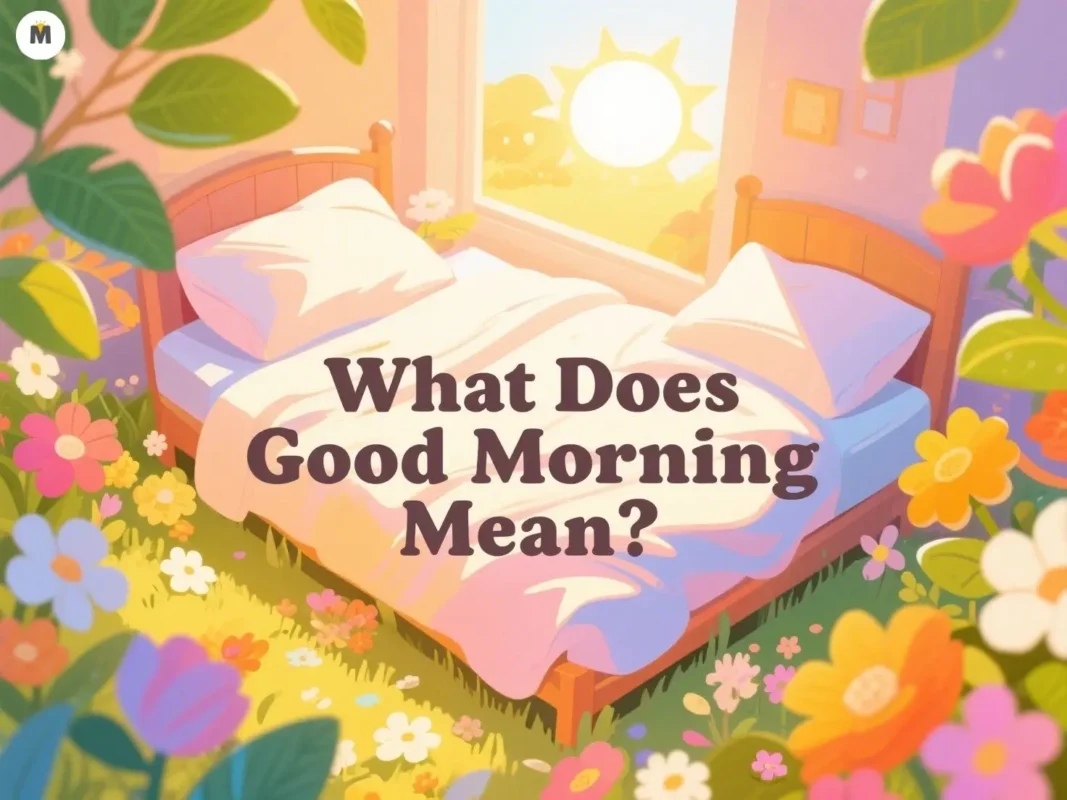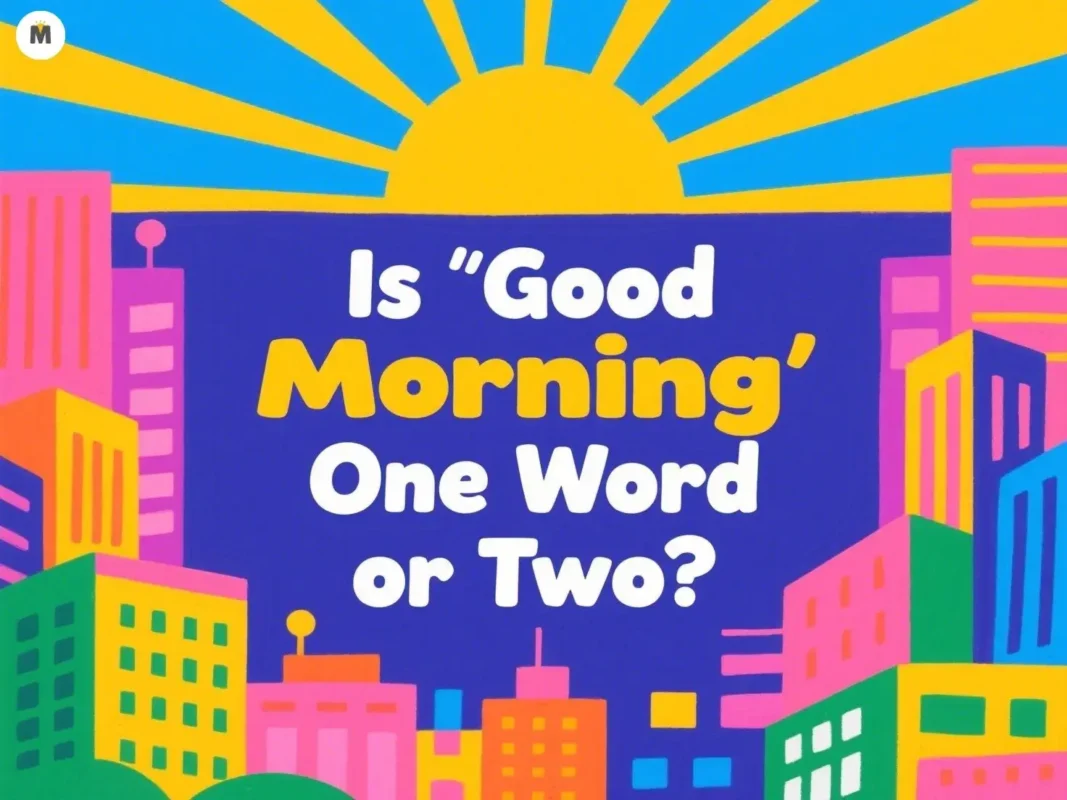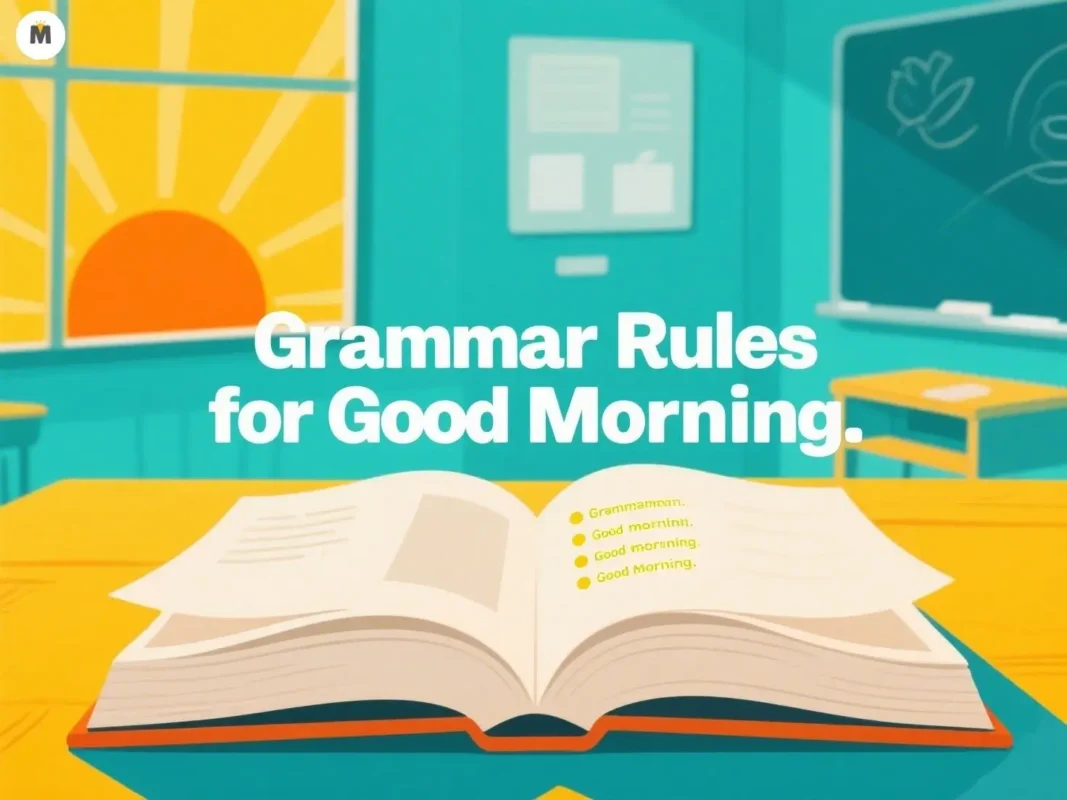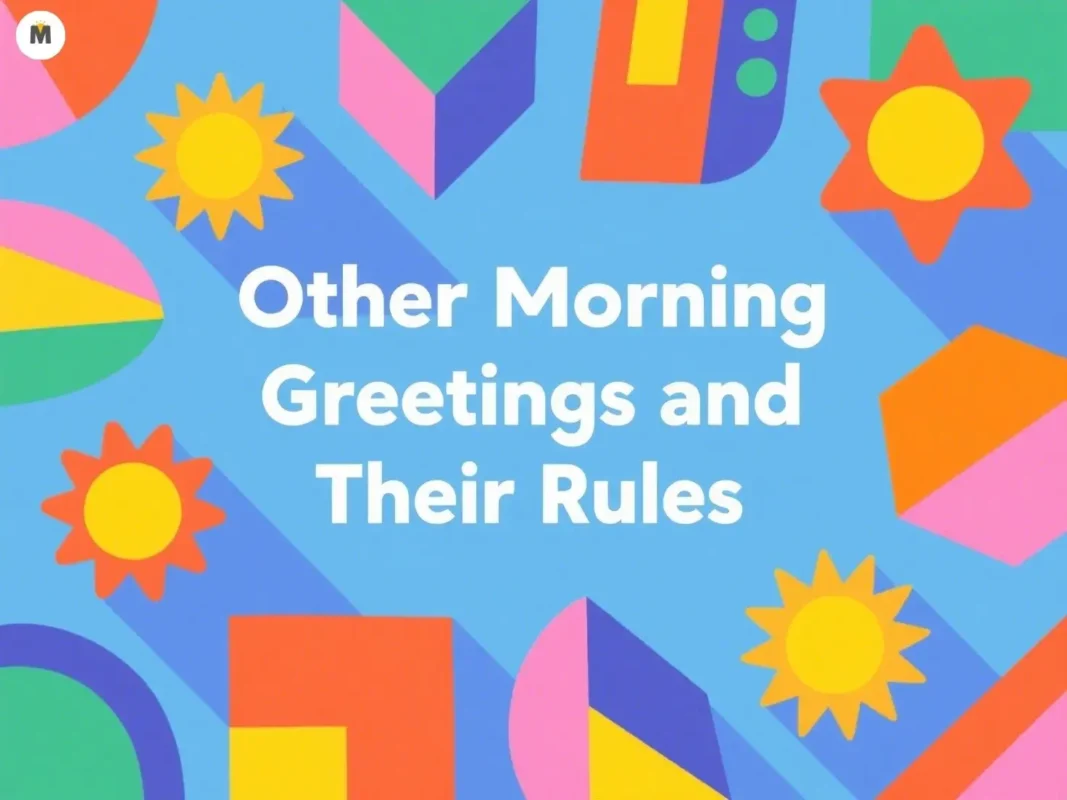The phrase “good morning” is a common greeting used daily, but many wonder, is “good morning” one word or two? This comprehensive guide clarifies the correct spelling, explores its origins, grammar rules, and practical usage, while incorporating SEO-optimized keywords like “good morning spelling” and “good morning grammar” to ensure clarity and searchability. Mastering the correct usage of this greeting enhances communication in both casual and professional settings.
Key Takeaways
- Correct Spelling: “Good morning” is always two separate words, not “goodmorning.”
- Grammar Matters: Proper spelling and capitalization improve communication clarity.
- Not a Compound Word: Unlike “goodbye,” “good morning” remains two distinct words.
- Contextual Usage: The greeting adapts to formal and informal settings.
- SEO Benefit: Using the correct phrase, like “is good morning one word,” boosts content visibility.
What Does “Good Morning” Mean?
“Good morning” is a polite, universal greeting used to acknowledge someone at the start of the day. Its origins trace back to Old English, where “good” expressed a wish for well-being, and “morning” referred to the time of day. This two-word phrase is an interjection, as confirmed by major dictionaries like Merriam-Webster and Oxford English Dictionary, making it essential to understand for proper good morning grammar.
Historical Context
- Old English Roots: The term evolved from early greetings wishing someone a pleasant day.
- Modern Usage: Today, it’s a standard greeting in English-speaking cultures, used in verbal and written communication.
Why It Matters
Using the correct good morning spelling demonstrates attention to detail and professionalism, whether in emails, conversations, or social media posts. Misspelling it as “goodmorning” can confuse readers and harm your credibility in professional or online settings.
Is “Good Morning” One Word or Two?
The definitive answer to is “good morning” one word: It is two separate words. Writing it as “goodmorning” is a grammatical error. Here’s why:
Dictionary Confirmation
- Merriam-Webster Dictionary: Defines “good morning” as a two-word phrase used as a greeting.
- Oxford English Dictionary: Confirms “good morning” as two distinct words, never hyphenated or combined.
- Cambridge Dictionary: Lists “good morning” as a standard two-word greeting.
Common Misconceptions
The confusion around is good morning one word or two often stems from compound words like “goodbye” or “goodnight,” which are single words. However, “good morning” is a phrasal greeting, not a compound word, as per English grammar rules.
Why People Get Confused
- Similar Compound Words: Terms like “goodbye” or “sunrise” lead some to assume “good morning” is one word.
- English Exceptions: The language’s many rules and exceptions make phrases like “good morning” tricky for non-native speakers.
- Autocorrect Errors: Some tools incorrectly merge the words, adding to the confusion around good morning spelling.
Grammar Rules for “Good Morning”
Proper grammar ensures “good morning” is used effectively in various contexts. Below are key good morning grammar rules:
Capitalization Guidelines
- As a Greeting: Capitalize both words in “Good Morning” when used as a standalone greeting or in salutations (e.g., “Good Morning, Team!”).
- Within a Sentence: Follow standard sentence capitalization. For example, “I said good morning to my neighbor” only capitalizes the first word if it starts the sentence.
- Formal Writing: In emails or letters, “Good Morning” is typically capitalized in the salutation (e.g., “Dear John, Good Morning,”).
Separate Words, Not a Compound
Unlike true compound words (e.g., “notebook” or “fireplace”), “good morning” remains two words. This distinction is critical for correct good morning spelling and grammar.
Punctuation
- Exclamation or Comma: Use an exclamation point for enthusiasm (e.g., “Good Morning!”) or a comma for a formal tone (e.g., “Good Morning, Sarah,”).
- No Hyphen: Never hyphenate “good morning” (e.g., “good-morning” is incorrect).
Examples of Correct Usage
| Context | Example |
|---|---|
| Formal | “Good Morning, esteemed colleagues.” |
| Informal | “Good morning! Ready for coffee?” |
| Mid-Sentence | “She greeted me with a cheerful good morning.” |
Other Morning Greetings and Their Rules
Similar greetings follow the same grammatical structure as “good morning,” addressing queries like is good morning one word. Below are examples, followed by a table comparing their spelling and usage for better clarity and SEO:
- Good Day: Two words, capitalized as a greeting (e.g., “Good Day, everyone!”).
- Top of the Morning: A traditional phrase, written as separate words with standard capitalization.
- Morning: Used alone as an informal greeting, capitalized only at the sentence’s start or in salutations (e.g., “Morning, Alex!”).
Comparison of Morning Greetings
The table below summarizes common morning greetings, their correct spelling, and grammar rules to help users understand good morning grammar and related phrases:
| Greeting | Correct Spelling | Number of Words | Capitalization Rule | Example Usage |
|---|---|---|---|---|
| Good Morning | Good morning | Two | Capitalize as greeting or salutation | “Good Morning, team!” |
| Good Day | Good day | Two | Capitalize as greeting or salutation | “Good Day, everyone!” |
| Top of the Morning | Top of the morning | Four | Capitalize as greeting or salutation | “Top of the morning to you!” |
| Morning | Morning | One | Capitalize only at sentence start or in salutations | “Morning, Alex!” |
This table enhances readability and provides a quick reference for users searching for is good morning one word or two or related greeting rules, improving SEO by catering to user intent.
Why Correct Spelling Boosts SEO
Using the correct good morning spelling in online content improves search engine optimization (SEO). Here’s how:
- Keyword Accuracy: Search engines prioritize content with correct grammar, as it signals quality and authority for queries like is good morning one word.
- User Intent: People searching for “good morning spelling” or “is good morning one word or two” expect accurate answers. Using the correct phrase aligns with their queries.
- Readability: Proper spelling and structured content, like tables, enhance user experience, reducing bounce rates and increasing time on page.
- Voice Search: With voice assistants like Siri and Alexa, accurate phrasing matches spoken queries (e.g., “Is good morning one word?”).
SEO Tips for Content Creators
- Target Keywords: Naturally include phrases like “is good morning one word,” “good morning spelling,” and “good morning grammar” in headers, body text, and tables.
- Use Headers and Tables: Break content into H2, H3 headers, and tables (as above) to improve scannability and SEO ranking.
- Internal Linking: Link to related grammar or language guides on your site to boost engagement.
- Meta Description: Write a concise meta description (e.g., “Discover if ‘good morning’ is one word or two, its correct spelling, grammar rules, and usage tips for clear communication.”).
Practical Applications of “Good Morning”
Using “good morning” correctly enhances communication in various scenarios, answering is good morning one word in practical terms:
- Professional Emails: Start with “Good Morning, [Name],” to set a polite tone.
- Social Media: A post like “Good morning, followers! What’s your day like?” engages audiences.
- Casual Conversations: Saying “Good morning!” to friends or coworkers fosters positivity.
Example Scenarios
- Workplace: “Good Morning, team! Let’s review today’s agenda.”
- Personal: “Good morning, Mom! How did you sleep?”
- Written Communication: “Good Morning, I hope this email finds you well.”
Conclusion
Mastering the good morning spelling and usage is more than a grammar exercise—it’s a way to communicate clearly and professionally. Always write it as two words, capitalize appropriately, and use it to set a positive tone. By following these good morning grammar guidelines and leveraging structured content like tables, you’ll avoid mistakes, improve language skills, and boost your content’s SEO performance for queries like is good morning one word. Whether greeting a colleague or optimizing a blog post, “good morning” is a small phrase with a big impact.
Frequently Asked Questions (FAQ)
Q. Is “good morning” one word or two words?
“Good morning” is always two separatebur separate words, as confirmed by dictionaries like Merriam-Webster and Oxford.
Q. How do I spell “good morning” correctly?
Spell it as GoodMorning like “good morning” with a some space between the words. “Goodmorning” is incorrect.
Q. When should I capitalize “good morning”?
Capitalize both words in a standalone greeting or salutation (e.g., “Good Morning, John!”). Within a sentence, follow standard capitalization rules (e.g., “She said good morning.”).
Q. Are there exceptions to the two-word rule for “good morning”?
No, “good morning” is always two words, regardless of context.
Q. Why do people think “good morning” is one word?
Confusion arises from compound words like “goodbye” or autocorrect errors merging the words.
Q. How can I use “good morning” in a sentence?
Examples include: “Good Morning, how’s your day going?” or “I wished loving her a good morning.”
Q. Is “good morning” a compound word?
No, it’s a phrasal greeting, not a compound word like “notebook.”
Q. What are other morning greetings?
Examples include “good day,” “top of the morning,” or simply “morning,” all following similar good morning grammar rules.














